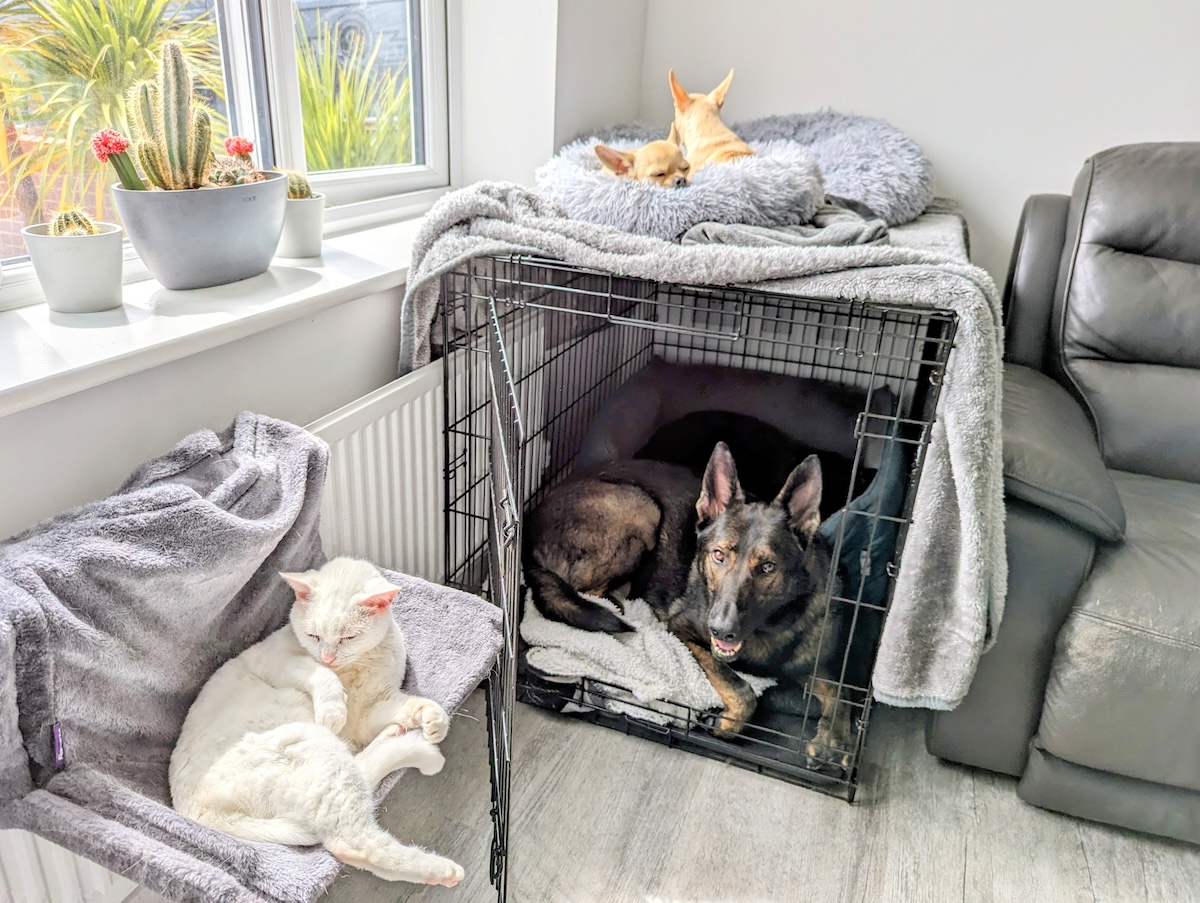- July 5, 2024
7 Reasons Dr. Karyn Loves Them – Dogster

The information is current and up-to-date in accordance with the latest veterinarian research.
Hi, I’m Dr. Karyn. Read my introduction to learn more about me and my five funny dogs, Poppy, Bailey, Kodah, Ned, and Fred.
Let’s get one thing out of the way before I tell you all the ways that crates are great. Many people hate the idea of putting their dog in a cage, but I think it’s all about perception. If you stop looking at it as a cage, and think of it as a doggy bedroom, it can open your eyes to what a crate can really represent for your dog.
Your dog’s crate should be somewhere they want to go, so it’s important to make them comfortable and cozy.
There are loads of benefits to making a crate a temporary or permanent fixture in your home, as well as some unconventional ways my dogs have put them to use! So before you dismiss them as cruel or unkind, let me tell you why I think crates are great.
The 7 Reasons I Think Crates Are Great:
1. They Provide Security
Imagine you’re a pup who’s just been brought into a new home. There are lots of new rooms to explore, but it’s also a bit daunting. Having a smaller, snug space that is just theirs, with soft blankets and cuddly toys, can be a wonderful way to make sure they feel safe and secure. And if your dog is comfortable in a crate at home, it makes traveling much easier too – their bedroom can come with you!
2. They Help With Housetraining
As a rule, most puppies will avoid toileting in their bed, so having your pup spend the night in their crate means you can take them out first thing in the morning and celebrate as they do their business outside.
3. They Can Help Prevent Excessive Barking and Howling
There are many different reasons why some dogs become incessant barkers, but the most common is anxiety. Some dogs feel overwhelmed by the world around them, others feel they need to guard house and home from anything that moves. If your dog has been brought up with a crate, they are less likely to feel anxious about being alone, or like they need to defend your home.
If your dog is particularly attached to you, putting them in their bedroom when you go out means they are less likely to spend the day pining and searching for you, helping avoid the development of separation anxiety.

4. They Keep Your Dog Safe
Much as you might try to puppy-proof your home, there will always be power cords to chew, breakables to knock over, dangerous items to eat, and narrow spaces to get stuck in. Knowing your pup is safe and sound in their crate allows you to shop, shower, and sleep in peace.
5. They Give Your Dog Space
If you have a busy home, with kids and pets creating chaos left, right and center, having a crate gives your dog somewhere to retreat when they need some time and space to themselves. For this reason, it’s important to make sure children know that if your dog has taken themselves off to their crate, they should be left alone.

6. They Can Be a Great Time-Out
While a crate should never be used for punishment, they are a great way to settle a hyperactive canine. When Kodah is getting a bit worked up, we’ll often tell him to go to bed, and he’ll go and lie down and chill for a while. This has become such a regular part of his routine that I have noticed that if he’s become over-excited, he’ll actually take himself off to his crate! For a dog that thrives on order and direction, he often uses his crate like a ‘reset’ button.
7. They’re the Perfect Recovery Space
If your dog is recovering from surgery, a crate is the perfect place for them to do it. And if your dog is no stranger to a crate, they won’t be stressed when they find themselves back in one.
Our Dogs Love Crates
Once Kodah was over 12 months old, we packed away his crate, but found that his hyperactive behavior started getting worse. He became more vocal, running around the house as though he didn’t know what to do with himself. Back up went the crate and things improved. Most of the time that he’s in his crate, the door isn’t closed or latched; he just uses it as his bed. That’s if it’s not been occupied by another dog, or even a cat!
When Bailey started wanting to spend more time outside, we put a soft bed outside to stop her from lying on the hard ground. However, she ignored the bed. When we set up a crate for her outside, she immediately started using this on a daily basis.
With Kodah’s crate being set up under our front window, the top of it has become prime real estate for cats and the Chihuahuas, Ned & Fred. On occasion, I’ve even caught Kodah enjoying the view from up top!

How To Get Your Dog to Love Their Crate
If you’re bringing a new dog or puppy into your home, get a crate set up first. Place it in a quiet corner where they can still feel part of the family, but away from busy, high traffic areas. Make it cozy. Drape blankets over the top and sides, and use beds and blankets to create a wonderland of comfort inside. Don’t go investing in a top-of-the-range dog bed straight away in case your dog turns out to be a chewer!
Provide some toys and chews, but don’t leave anything in with your pup that could break or become a choking hazard. For overnight, I usually recommend providing a small amount of water in a heavy bowl that won’t tip over; enough for them to have a little drink if they’re thirsty, but not so much as to really test their bladder strength.
Put them in their crate after meal times, and after about 20 minutes take them out to the toilet. This will help them create the association that they will be allowed out to the toilet from the crate, and receive lots of praise for going!
The First Few Nights
The first nights with a new puppy are the worst, and where you will set the scene for your dog’s future. Weaken here, and regret it forever!
Some dogs settle quietly from their first night, others will protest long and loud. If you have near neighbors, I recommend letting them know that you have a new pup and that there may be some noisy nights ahead. One of the main reasons most people cave into their puppy’s cries is for fear of upsetting the neighbors.
Be prepared that your pup may scream and cry and howl for hours. And hours. Get yourself some earplugs. The moment you give in and take them out for a cuddle, you have rewarded them for sticking it out, and they know that next time, all they need to do is keep on crying until they get what they want. Eventually they will settle down. I promise you.

It may take a couple of nights, or it might be a week; be strong. You will feel mean and cruel and horrible, but you will be grateful in the end that you have a pup that can be left alone without screaming the house down. If you want to check in to make sure they’re okay, do it quietly and without them seeing you. A baby monitor is a great way to keep tabs on them from a distance.
If you ‘save’ them from their crate, they will never see it as their bedroom, but something to escape from. Once they have settled into sleep there, it becomes a place of sleep and relaxation.
Crates Don’t Need To Be Forever
You might decide to make your dog’s crate a permanent fixture, or it may just be a training tool – whatever works for you and your family is fine. There are some really nice cupboards and cabinets for dog crates that look like proper furniture, so they don’t have to be an eyesore.
In our house, the crate door is open overnight, so the dogs can choose to sleep inside or not. Of course, most of the time there are at least two in the bed with us!

Crates Aren’t Always the Perfect Solution
Yes, I think crates are great, and that a lot of separation anxiety and obsessive barking can be prevented and helped by having one in your home. However, there will always be times when a crate isn’t the right solution for your dog.
Dogs that have been abused, abandoned, or locked up in cages will often have powerful, negative reactions to a crate, and there is no way it will ever be a place of comfort for them.
For tiny dogs, like my Chihuahuas, crates may not work as well for potty training, as it’s hard to find a crate that’s large enough to be comfortable, but small enough that they won’t just use one end as a toilet. I’ll talk a little more about this issue in an upcoming article: Ned, Fred, and Bed: An Unconventional Approach to Toilet Training.

Tags
What do you think?
Related Articles

New Puppy Checklist: Gear You’ll Need for Your New Dog
Getting a new puppy is really exciting, but before you welcome them home, it’s important to prepare your space for them. Since puppies need a

How Big Do Mini Poodles Get? Vet Reviewed Average Weight & Growth Chart – Dogster
The information is current and up-to-date in accordance with the latest veterinarian research. Learn more » When you buy a Miniature Poodle, you might not

Can Police Dogs Smell Nicotine? Vet Verified Facts & Info – Dogster
The information is current and up-to-date in accordance with the latest veterinarian research. Learn more » While cigarette sales have been declining steadily for decades,

How Old Is 5 in Dog Years? Vet-Approved Guide to Each Size of Dog – Dogster
The information is current and up-to-date in accordance with the latest veterinarian research. Learn more » A common method for calculating a dog’s age is

